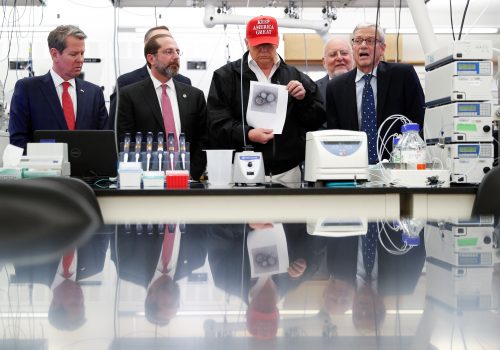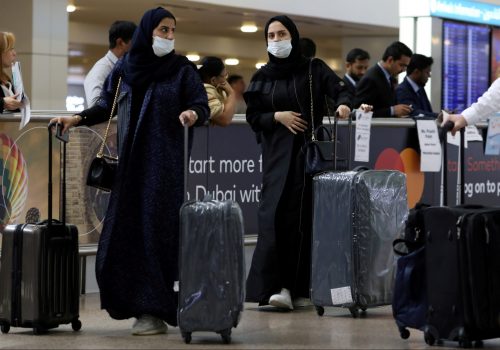CORONAVIRUS ALERT 3/9/2020
The Atlantic Council’s Coronavirus Alert is a regular summary of policy, economic, and business events around the emergency. To stay updated, sign up to the Coronavirus Alert here.
Summary:
The number of cases of Coronavirus surpassed 110,000, while oil prices had their sharpest falls in almost thirty years, roiling stock markets worldwide. Italy imposed a lock-down of swathes of the wealthy north of the country, affecting 16 million people, in a bid to contain the spread of the virus.
Statistics:
There are in excess of 110,000 cases worldwide in more than 100 countries; almost 3,900 people have died.
QUOTE: “We will use a massive shock therapy. To come out of this emergency we will use all human and economic resources,” Italy’s premier Giuseppe Conte told la Repubblica, Reuters said. “Europe cannot think of confronting an extraordinary situation with ordinary measures.”
HEALTH AND SCIENCE:
- Twenty-one people have now died in the United States, most of them in Washington state. Cases topped 500 across more than thirty states, as well as the first infection in the District of Columbia.
- Italy imposed a lockdown on vast areas of the north of the country in an effort to contain the virus. The number of coronavirus deaths there jumped to 366, Reuters reported.
- China reported no new cases outside Wuhan, the capital of the province that’s at the center of the outbreak, The New York Times said, citing a Reuters report.
- Oregon is the latest state to declare an emergency, following New York on March 7, CNBC said. They join California, Florida, Indiana, Kentucky, Maryland, Utah, and Washington.
- The number of coronavirus tests in the United States has fallen far short of official predictions, The Atlantic reported March 6, saying it could only verify that 1,895 have been tested, of which 10 percent tested positive for the virus. Local officials can only test several thousands daily, not the tens or hundreds of thousands needed to match White House promises, The Atlantic said.
- The White House and the Centers for Disease Control and Prevention, have become more distrustful of each other, CNN said. A delay in sufficient testing for the virus is among the points of contention, CNN reported.
- “The Handshake Is on Hold. And so is the hookup,” says a New York Times headline. New means of social contact include skipping the two-kiss greeting in France and Switzerland or opting for namaste, the greeting used in India, in Israel. A man in New York, recognizing the lack of logic, no longer shakes strangers’ hands but still hugs his friends.
QUOTE: “We’re shifting into a mitigation phase, which means that we’re helping communities understand, you’re going to see more cases,” said Jerome Adams, the US surgeon general, CNN reported. “Unfortunately, you’re going to see more deaths.”
FINANCE AND ECONOMICS:
- “Historic Day in Markets Has Traders Rethinking What’s Possible,” reads a Bloomberg News headline after the price of oil had its biggest drop since 1991, money flooded into government bonds and share prices dropped from Australia to Europe via Taiwan, the newswire reported.
- Work-from-home arrangements to contain the spread of the virus have added to the uncertainty, Bloomberg said. “When you’re working at home without colleagues, you feel more nervous about things,” it cited Shane Oliver, head of investment strategy and chief economist at AMP Capital Investors, as saying.
- The UK budget is scheduled to be held on March 11. Chancellor Rishi Sunak has promised targeted measures to help businesses and individuals “get through to the other side” as they face the economic impact of coronavirus, The Telegraph cited him as saying.
- “Coronavirus will change the world. The “how” is growing clearer with each day of its global spread,” writes The Atlantic Council’s Frederick Kempe. “What we’re learning—in real-time, Darwinian fashion—is that proactive countries, societies, and individuals are performing far better than reactive ones.”
QUOTE: “It’s almost like everyone is hypnotized together and levels are just going south with nobody able to halt the slide,” Tsutomu Soma, a bond trader at Monex Inc. in Tokyo, who experienced the Black Monday crash in 1987, cited by Bloomberg. “It’s been a while since I saw this kind of sell-off.”
BUSINESS AND TRAVEL:
- “US citizens, particularly travelers with underlying health conditions, should not travel by cruise ship,” the State Department said in a travel advisory.
- The UK’s Foreign and Commonwealth Office advised against all but essential travel to the north of Italy. The US State Department issued a “do not travel” notice for the Lombardy, which includes the financial capital of Milan, and Veneto regions in a February 29 advisory.
- The Indian Wells tennis tournament, scheduled to take place from March 9 to 22, was cancelled because of coronavirus, Forbes reported. It’s the first major US sporting event to be called off, Forbes said.
- The Bahrain Grand Prix will take place behind closed doors on March 22, Sky Sports reported.
- Barcelona’s marathon, due to take place on March 7, became the fourth marathon or half-marathon to be called off in three days, The Telegraph reported. Organizers of the London Marathon set for April 26 hope a decision will be made as late as possible, the newspaper said.
- Universities in the UK face a shortfall of hundreds of millions of pounds in tuition fees as international students from China and elsewhere cancel or postpone their studies, The Guardian reported.
- The US Army is restricting travel to Italy and South Korea, CNBC reported.
- The Grand Princess cruise ship, moored off the coast of California with at least twenty-one people aboard tested positive for the virus, is set to moor in Oakland today, Associated Press reported. More than 3,500 passengers, from fifty-four countries, will travel to their home countries or military bases for a fourteen-day quarantine, AP said.
QUOTE: “What I really want to concentrate on is the idea of getting enough tests out there to get an evidence-based foundation of where we are,” Dr. Anthony Fauci, director of the National Institute of Allergy and Infectious Diseases, quoted in The New York Times. “We need to know the extent of the community spread.”
RESOURCES
- Johns Hopkins University interactive web-based dashboard to visualize and track reported cases in real-time.
- CDC provides frequent updates and background information on Coronavirus.
- The World Health Organization daily situation reports.
- Harvard Business Review guidance on managing the emergency for corporate decisionmakers.
- The Society for Human Resource Management resources on managing communicable diseases.
- The Wall Street Journal has a useful guide to travel and travel insurance.
- State Department Travel Advisory for China.



